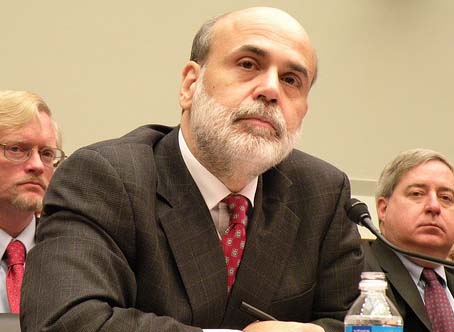Federal Reserve chief Bernanke to testify as stress tests near
 Washington - With the US central bank expected to release the results of long-awaited bank stress tests later this week, Federal Reserve chief Ben Bernanke will testify before Congress on Tuesday on the nation's economic outlook.
Washington - With the US central bank expected to release the results of long-awaited bank stress tests later this week, Federal Reserve chief Ben Bernanke will testify before Congress on Tuesday on the nation's economic outlook.
Bernanke could also comment on the closely-held results of the two-month-long stress tests, which could be released as early as Thursday.
At least six of the 19 largest US banks need more capital to remain healthy through the recession, according to leaked information from the stress tests over the past week. They include the giant Citigroup and Bank of America, both of which have received considerable bail-out money from the US government.
The banks received the results of the stress test on April 24, and were given time to appeal and argue the findings with examiners. Appeals have been filed by Citigroup and Bank of America, Bloomberg financial news service reported last week.
There is concern among both regulators and bank officials about the financial fallout the report will have.
On Wall Street Monday, Bloomberg financial news service reported increasing indications that traders expect already depressed bank stocks to further fall with the release of the stress test results.
The practice of "short-selling" - in which traders borrow stock, sell it at a current price, then buy them back at a lower price to return to the owner - has been severely criticized by analysts for contributing to the plunge of the stock market since the financial crisis burst open last September.
Bloomberg reported that the number of Citigroup Inc shares borrowed and sold short increased sixfold since February 27, the day the US Treasury said it would convert some of its preferred shares into common stock.
Short sales of Bank of America Corporation have climbed more than 40 per cent in the same period.
Further cash infusions for stressed banks could come from the US government, but more likely from more conversions of shares to common stock.
"People are either positioning themselves for the potential of a preferred-to-common conversion, or they have an increased perception of risk in these companies," Andrew Baker, an equity strategist at Jefferies & Co in New York, was quoted by Bloomberg as saying.
The 19 banks in the stress test were selected for having more than 100 billion dollars in assets. Together, they hold two-thirds of the assets and more than half of the loans in the US banking system.
Under the plan, banks which are found short of capital could be forced to sell ownership stakes to the US government.
Seeking to reassure nervous investors, the Federal Reserve said April 24 that most US banks have capital levels "well in excess of the amounts required to be well capitalized."
Given the "heightened uncertainty" about the future course of the US economy, however, regulators are looking for banks to have enough capital for the next two years to keep credit lines flowing.
The test has caused jitters among investors over fears the programme could end up with the government nationalizing banks. Banks are also resisting suggestions that the government could limit managers' salaries and bonusses, even as public outcry grows over bonusses paid out of government bail-out money last year.
Both the US government and the Federal Reserve have pumped unprecedented hundreds of billions of dollars into struggling US banks as they try to keep their heads above a flood of failed US mortgages that are at the heart of the world financial crisis. (dpa)